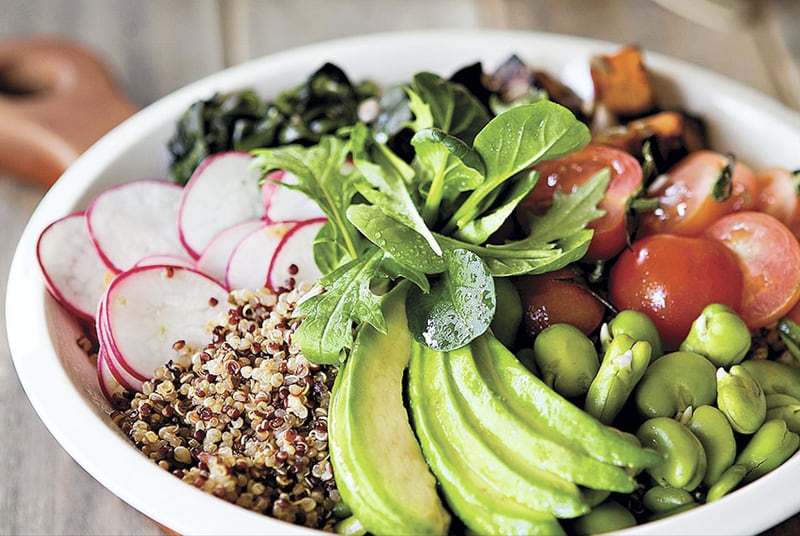Aitor Sánchez, a Spanish dietician-nutritionist and food technologist, recently published What’s Happening to Nutrition?, a book in which he dispels some of the open myths about the role of diet.
We know how much what we eat and what we don’t eat can affect our health. health physical and mental. For this reason, we often see how food It is a source of controversy and debates on which there seems to be no consensus. Although one might think that some of these questions have already been forgotten, they still float in today’s society.
Is intermittent fasting a magic bullet? Is milk essential for everyone and at all ages? Can ultra-processed products be consumed in moderation? Is the vegetarian or vegan diet incomplete? Does a glass of wine a day help prevent disease?
These are just some of the questions that continue to hover around the act of eating itself. We hear them in conversations, on social networks, in the media and even among health professionals.
The person who thought about this phenomenon was the dietitian-nutritionist and food technologist, Aitor Sanchez . In his most recent book, What about food? (Paidos), The specialist took ten currently open nutrition debates and broke them down one by one, clarifying the strong and weak points.
And what makes these debates continue to appear? Sánchez mentions that this is due to several factors. One of them is related to the fact that there are health professionals who are not informed about nutrition. He also believes that this is influenced by conflicts of interest in the food industry and by people with extremist positions on certain products.
“As so many contradictory messages have been heard, especially on the networks, we thought it was time to select these main themes on which we hear the same and the opposites,” explains Sánchez. The third .
Eating: a controversial act
Why does food cause so much doubt?
Food defines us and is very present in our lives, which gives it great influence. This involves economic, gastronomic and cultural interests, which means there are many pressures. From lobbies who want their products to be consumed to gurus who spread ideas.
What should we be clear about intermittent fasting? Is it a magic formula as we have associated it?
It’s an additional way to limit energy and calories, and it has very little additional benefit over traditional restriction. In a world where people sometimes want practical solutions, advice as simple as “you should go so many hours without eating” is very popular. When you focus your intake on a very small window of time, you realize that it’s really complex to fill in all the calories you need for the day. Although it is a tool that helps you eat less, that does not make it magic, nor does it make it a panacea as there are often gurus trying to sell it.

Does this serve as a strategy for everyone?
For some people it can be a good ally, for example those who find it easy to apply or that it fits their lifestyle. Then there may be profiles where the opposite happens, where intermittent fasting makes them anxious and they feel like they’re following a plan that’s too restrictive. If it is the profile of a person who does not have a good relationship with food or who may have an eating disorder, then we would not start there, but neither would we start with the general population. We cannot recommend it to everyone nor say that it is dangerous.
What are the main problems you have identified with the dietary model?
There are countries in which ultra-processed foods pose a great danger. We have seen it in Latin America with the presence of sugary drinks; in Chile their consumption was very high a few years ago, but fortunately they started with front labeling. There are other countries in which there is a lot of talk about ultra-processed foods, as is the case of Spain, without many ultra-processed foods being consumed.
I believe that the major health problems are the absence of fresh plant products, an excess of animal and processed proteins, that is to say cold meats, industrial pastries, alcoholic drinks and soft drinks.
How much truth is there in saying that consuming ultra-processed products “in moderation” will be acceptable?
It is not positive to transmit these messages. It is true that there is a space in our diet in which we can consume foods that are not healthy, because the important thing is what we do 90% of the time. However, there is already a large presence and promotion of these products, and we also see that the population has a very poor understanding of what moderation is. No one is able to identify to what extent ultra-processed foods are good and which are not acceptable.

In the book you also address some debates about vegetarian and vegan nutrition, which is perhaps one of the most discussed points in recent years.
Yes, these myths basically revolve around the fact that it is an incomplete diet because of protein, vitamin B12, omega 3 and other things, but basically the vector of confusion is that it is an incomplete diet and it is dangerous to follow it. This is one of the messages we must combat most as dietitians and nutritionists. Unfortunately, this is another example of how the meat industry or the dairy industry has repeatedly tried to say that it is dangerous not to eat meat, fish or dairy.
There are things that are more open to interpretation, but it is not possible to interpret that a 100% plant-based diet can be perfectly complete and that it even has more health benefits than harms.
One of the most common concerns about this diet is that it is deficient in iron.
The question of iron is absurd, because it doesn’t work that way. It is curious how much iron deficiency anemia still exists in countries that are large consumers of meat and it is also known that prescribing meat does not improve the projection of iron deficiency anemia.
We also have very clear epidemiological studies in which it appears that there is no higher risk of anemia in the vegetarian and vegan population than in the conventional population. Curiously, this much repeated fear of “that they will suffer from anemia” is not mentioned in the opposite direction, namely that vegetarian diets have a lower incidence of cancer, overweight, obesity and diseases. cardiovascular.
We are living through the “protein era,” where many products claim to contain additional amounts of this macronutrient. What do you attribute this boom to?
This fashion is partly due to economic interests. Over the last 10 years, protein has grown in popularity as it stopped being that nutrient that only athletes took and became something positive for the general population that also helps with feeling full and can make people older. maintain their muscle mass.
Another thing is that we need to include it more or the prices they put on certain foods are justified to add a little more protein to a yogurt. The food industry takes advantage of the fact that proteins now have a good reputation to add a few extra grams and charge you an often unjustified amount, because the increased amount is usually very small.

Are dairy products as essential as suggested? For all ages?
No not at all. Scientifically, this makes no sense. If it were essential, what would we do with all the people allergic to dairy products? Thousands of people cannot eat dairy products due to allergies or intolerances. Would we say that their diet is incomplete? No. This is a clear example that it is not necessary to consume dairy products.
We come from decades in which milk was widely promoted and should be used for growth and development. We are now in the decade of functional yogurts and fermented products, where you are subconsciously told that there is one for everyone in the family, you just need to choose yours. The fact that there is so much variety makes us maintain the idea that yogurt is necessary. In terms of scientific evidence, these foods are often counterproductive because they contain a large amount of sugar.
If they are not essential, what role can they really play in our diet?
It seems to me that they can have a more interesting function by complementing or enriching dishes, but that they do not replace or supplant other products, such as fruit. Maybe there’s a little cheese in a healthier salad or sauce.
You say that the perception of risk linked to alcohol consumption is very disconnected from reality. Why does this happen?
This recommendation has come repeatedly from the medical community, such as doctors who have appeared on television to claim that wine is cardioprotective and healthy. Although we hear that alcohol is bad, the industry has also made a lot of effort to get health personnel to recommend it. When we think of alcohol as bad, we think of distilled spirits like whiskey, but not beer or wine. That’s where this disconnect comes from.

And what is the use of so-called responsible alcohol consumption? It’s possible?
It’s complicated when we talk about “alcohol in moderation” or “responsible consumption”, or now, as we are going to start saying in Europe, “non-harmful consumption”. We are talking about a substance that from the first minute is harmful to health and can cause several problems. Instead of making this kind of communication, it would be much more responsible to say “if you feel like having a glass of wine, go for it, but less is more.”
There is a lot of talk about the daily glass of wine to prevent disease.
Yes, but a glass of wine is not going to improve your health. When we feel like taking one, let us take it, but not for health reasons, because it will not help us at all.
Are there safe levels of alcohol consumption?
They do not exist as such. There was recently a study in the British Medical Journal who said that there are no safe consumptions, so it would be very unwise to recommend a dose. We cannot say “aim for less than 20 grams of alcohol per day”, that is irresponsible. Because? Because even at low doses, there is harm.
If you want, have a drink. I believe that you can drink a few units of alcohol sporadically without it having a big impact on your health. But it seems to me that at the level of communication and public health, we must give priority to at least, at best.
Source: Latercera
I am David Jack and I have been working in the news industry for over 10 years. As an experienced journalist, I specialize in covering sports news with a focus on golf. My articles have been published by some of the most respected publications in the world including The New York Times and Sports Illustrated.


